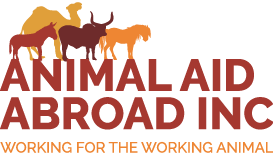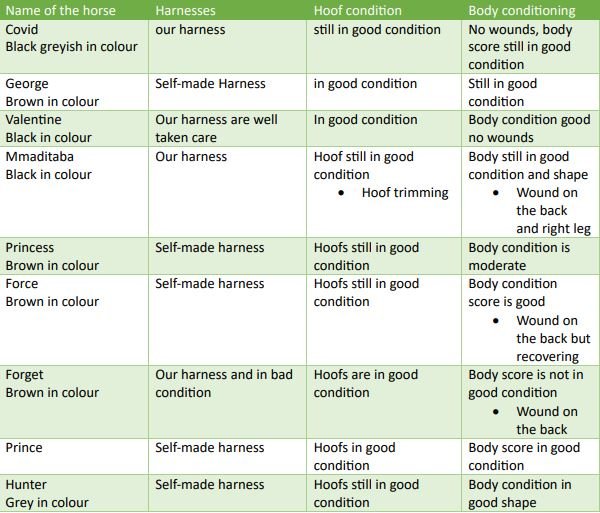Blindlove Cart horse Thaba’nchu, Free State, South Africa- March report
It is only because of the funds from donors such as yourself, that we are able to provide valuable and meaningful education about harness care for horse owners in Thaba’nchu. As Itumuleng Modise of the Agripreneur Farmers team reports, this is important for a sustainable solution and strategy to address the concerning and persisting issue of wounds inflicted by poor-quality harnesses.
Itumuleng runs the outreaches every month and discusses this work that has been made possible because of your kind and wonderful support:
Harness care and education
For the month of April (and possibly going forward if it works as a better solution to the harnesses in Thaba’Nchu), we will be sending up rolls of the webbing straps, uncut, together with strong thread to sew, needles, the D rings and buckles.
The team will hold practical sessions with the owners where they can cut, sew and adjust the harnesses as they want, to fit them to their own horses.
This might even lead to an owner being able to sew up & repair harnesses for us on the spot in Thaba’Nchu and even generate a small income to become a ‘service provider’ to the cart horse community.
The reason behind this is that we are seeing owners cutting or adjusting the harnesses that we send up, and then because they don’t have the webbing straps or thread or needles, they are then simply adding other bits and pieces of string, rope and wire with knots, which entirely defeats the object of replacing harnesses!
This has been very frustrating (but not always the case, as some owners are really taking care of their harnesses that we have given them). So we have decided to send up all the raw materials they will need to put the harnesses together themselves and hopefully this might offer a solution, with the decent straps and webbing on hand.
A while ago, Itumuleng asked an old man why he wasn’t using the harnesses we had given him, and his reply was that he loved them and thought they were too beautiful to use! He didn’t want them to break! So perhaps with the webbing rolls on hand someone like him might then also start using his harnesses!
Also, as we have seen with the donkeys, the horses that are in a worse condition than others, generally seem to have owners that take less care of the harnesses we give them.
Horse Welfare Outreach
Promoting Responsible Ownership and Care
Horses have long held a special place in human history, serving as companions, partners in work, and athletes in various disciplines. However, alongside the joys of horse ownership come significant responsibilities to ensure their welfare and well-being. As such, the focus on horse welfare has become increasingly important in contemporary society.
Despite the cultural and economic significance of horses, issues such as neglect, abuse, and improper care still persist, highlighting the need for proactive measures to safeguard their welfare. This report aims to address these challenges through targeted outreach efforts aimed at promoting responsible ownership and care practices within the equine community.
About Horse Welfare Outreach:
Horse welfare outreach initiatives play a crucial role in raising awareness, providing education, and fostering positive behavioural change among horse owners, enthusiasts, and the general public.
These initiatives take various forms, including educational workshops, community events, online campaigns, and partnerships with local organizations and stakeholders.
The primary objectives of our horse welfare outreach efforts are to:
• Raise awareness about the importance of horse welfare and the impact of neglect and mistreatment.
• Educate horse owners and enthusiasts on proper care, handling, nutrition, and healthcare practices.
• Provide resources and support to empower individuals to become responsible stewards of horse welfare.
• Foster collaboration and dialogue among stakeholders to address systemic issues and promote collective action.
• Through targeted outreach activities, such as distributing educational materials, hosting hands-on workshops, and leveraging social media platforms, organisations and individuals can effectively engage with their target audience and inspire positive change in attitudes and behaviours towards horse welfare.
• By combining education, advocacy, and community engagement, horse welfare outreach initiatives strive to create a culture of compassion, responsibility, and respect for these magnificent animals, ensuring their well-being for generations to come.
Background Information:
In recent months, our equine community has faced a pressing issue concerning wounds inflicted by poor-quality harnesses. These substandard harnesses, often lacking proper padding and adjustments, have resulted in discomfort, abrasions, and even injuries to our beloved horses.
Recognizing the urgency of this issue, our organization has mobilised efforts to address it swiftly and effectively.
One of the key initiatives underway is the replacement of these inadequate harnesses with high quality, properly fitted alternatives. By prioritising the procurement and distribution of safe and durable harnesses, we aim to mitigate the risk of further harm to our equine companions.
Throughout the month of March, our dedicated team has been actively engaged in addressing the repercussions of these faulty harnesses. We have provided treatment and care to a total of 22 horses, each requiring attention for injuries sustained due to ill-fitting or defective equipment. These cases serve as poignant reminders of the critical importance of prioritising horse welfare and investing in proper equipment and resources.
In response to these challenges, our organisation remains committed to proactive measures aimed at promoting responsible horse ownership and ensuring the well-being of all equine partners. By addressing issues such as inadequate harnesses and providing timely care and support to affected horses, we strive to create a safer and more compassionate environment for horses and their caregivers alike.
This background information highlights the specific issue of wounds caused by poor harnesses and underscores the proactive steps being taken to address it. It sets the context for your outreach efforts and emphasizes the importance of promoting responsible ownership and care practices within the equine community
Methods:
To address the pressing concerns surrounding horse welfare within our community, our organisation implemented a multifaceted approach, encompassing a range of outreach activities and educational initiatives.
Outreaches
Throughout the reporting period, we organised a total of four outreach events, providing a platform for engagement and dialogue within the equine community. These events served as opportunities to disseminate crucial information, raise awareness about key issues, and foster collaboration among stakeholders.
Horse Welfare Workshop
In addition to our outreach events, we hosted a comprehensive animal welfare workshop, focusing specifically on equine welfare and responsible ownership practices. This workshop provided participants with valuable insights and practical knowledge on topics such as proper harnessing techniques, preventive healthcare measures, and recognizing signs of distress in horses.
Treatments
As part of our ongoing commitment to safeguarding horse welfare, our team conducted medical interventions to address injuries and ailments resulting from poor harnessing practices. A total of 22 horses received treatment for wounds and abrasions incurred due to ill-fitting or substandard harnesses. Additionally, we prioritised the replacement of faulty harnesses with high-quality alternatives, ensuring the safety and comfort of our equine companions.
Education and Outreach
In conjunction with our medical interventions, we seized the opportunity to educate horse owners and enthusiasts about various aspects of animal welfare. Through interactive sessions and informational materials, we emphasised the importance of proper care, handling, and management practices to enhance the overall well-being of horses. Topics covered included nutrition, hoof care, grooming techniques, and recognizing signs of potential health issues.
Hoof Trimming
Recognizing the significance of hoof health in overall equine welfare, our team provided hoof trimming services to horses in need. Proper hoof maintenance is essential for preventing lameness and ensuring optimal mobility and comfort for horses. By offering this service, we contributed to the holistic care and well-being of equine partners within our community.
By implementing these methods, our organization aimed to not only address immediate welfare concerns but also to empower horse owners and enthusiasts with the knowledge and resources needed to promote long-term health and happiness for their equine companions.
Through a combination of outreach, education, and hands-on interventions, we remain steadfast in our commitment to advocating for the welfare of horses and fostering a culture of responsible ownership within our community.
Conclusion:
In conclusion, our efforts to promote horse welfare through targeted outreach initiatives have yielded tangible results and reinforced the importance of proactive intervention and education within the equine community. Through a comprehensive approach encompassing outreach events, educational workshops, medical interventions, and practical interventions such as hoof trimming, we have made significant strides in addressing key issues affecting horse welfare.
The identification and mitigation of injuries caused by poor-quality harnesses underscore the critical need for ongoing vigilance and advocacy to safeguard the well-being of our equine companions. By providing treatment for wounds, replacing faulty equipment, and educating horse owners on responsible care practices, we have demonstrated our unwavering commitment to prioritizing the welfare of horses.
Moving forward, it is imperative that we continue to build upon these efforts, fostering a culture of compassion, responsibility, and stewardship within the equine community. By empowering horse owners and enthusiasts with the knowledge and resources needed to provide optimal care and support for their animals, we can ensure a brighter future for horses and strengthen the bond between humans and equines.
As we reflect on our achievements and look towards the future, let us remain steadfast in our dedication to advocating for horse welfare and championing the rights and well-being of these magnificent animals. Together, we can make a meaningful difference in the lives of horses and inspire positive change within our community.
On behalf of Blindlove, AAA thanks you, our donors for the long lasting impact that your funds are making a difference with. Horse owners, and the generations of those to follow, will know how to care for and treat their horses and harnesses with the respect and dignity they need and deserve to not just survive, but thrive.











